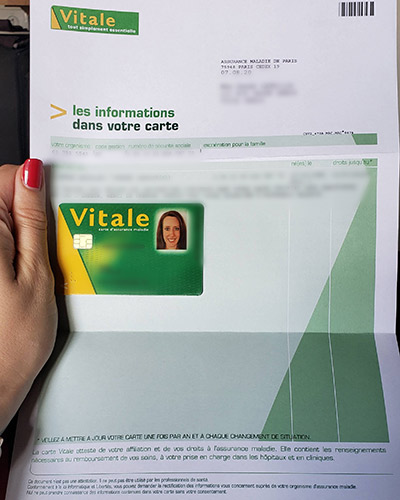French Healthcare: Everything to know about a Mutuelle

This post is part of my Healthcare in France for Expats series. If you found it helpful, check out my other articles and more to make navigating the system a little easier. Check back often—I’m adding new guides regularly to make French healthcare a little less confusing!
When you first arrive in France and get your sécurité sociale set up, it can feel like you’ve found all the pieces to the French healthcare puzzle. But here’s the thing, sécurité sociale, as generous as it is, usually doesn’t cover 100% of your medical costs. That’s where the mutuelle (top-up insurance) comes in.
If you read my deep-dive into the French Sécurité Sociale system, you already know it’s the first piece of the puzzle to health care coverage. A mutuelle is the second piece, designed to cover some or all of the remaining costs, things like specialist fees, dental work, new glasses, or even hospital stays. For many people in France, it’s not a luxury, it’s a necessity.
In this guide, we’ll walk through exactly everything to know about a mutuelle, what is it, who needs one, what it covers, how much it costs, and how to choose the right plan for your needs and budget. Whether you’re a student, freelancer, or here with a work contract, you’ll leave knowing if a mutuelle is right for you and how to get one without stress.
Table of Contents
What is a Mutuelle?
When you’ve heard about France’s healthcare system, you’ve certainly heard about the carte vitale and numéro de sécurité sociale, which are 2 things that are imperative to health coverage in France. One thing that is just as important is the mutuelle. This insurance is considered complémentaire santé, meaning it is top-up health insurance.
How much you pay out of pocket for healthcare can really vary. It depends on the type of care you need—anything from maternity to a work-related accident—plus the procedure itself, like a hospital stay, dental work, or getting new glasses or hearing aids. It also matters whether you follow the coordinated care pathway (parcours de soins), which affects how much SECU will reimburse you.
That’s where a mutuelle (supplementary health insurance) comes in. Think of it as a top-up to your SECU: it covers some or all of the costs the state doesn’t pay for. The exact amount depends on the plan you choose, so you can tailor it to fit your health needs and budget. Typically, SECU covers 70% up front of the costs and the rest, 30%, is left to the individual or if you have a mutuelle, this would cover that.
Is a Mutuelle Mandatory?
In short, no, a mutuelle is not mandatory. Anyone can sign up for a mutuelle individually as well as potentially have their family members covered by it. If you are working, your company is required to offer you a supplementary health coverage , but there are some exceptions on whether to accept it:
- If you are already covered as a dependent.
- If you already have individual coverage yourself.
- If you are on a CDD for at least 12 months or less.
- If you are an apprenti (apprentice).
Since January 1, 2022, the French government has been slowly rolling out a system where they chip in to help cover part of the cost of employees’ mutuelle contributions.
If you’re a student, freelancer, job seeker, or retiree in France, getting a mutuelle (supplementary health insurance) isn’t mandatory, but it’s definitely worth considering. SECU will cover part of your medical costs, but not everything. Without a mutuelle, you could end up paying the rest yourself, which can add up quickly for things like dental work, eyeglasses, hospital stays, or specialist visits with high fees.
A mutuelle helps protect you from those big, unexpected bills by covering some or all of the costs that SECU doesn’t reimburse. It’s basically a safety net for your wallet, giving you more predictable healthcare expenses and peace of mind in an already budget-friendly atmosphere.
What does a Mutuelle cover?
A mutuelle offers a variety of coverage and reimbursement, based on the policy and the premiums paid. Typically, one can look at general health care as 3 rungs on a ladder.
The first rung being basic health coverage. This covers the reimbursement of the co-payment, which is the difference between the total cost and the portion covered by SECU, for the most basic procedures, without any excess fees.
The second rung, intermediate health coverage, which provides better coverage for medical consultations and care, even with excess fees, medicines purchased at a pharmacy upon presentation of a prescription, standard hospitalisation costs, mid-range dental care and prostheses, and mid-range optical and ophthalmological care.
The third and final rung, optimum health coverage. This is a higher category of reimbursement. Your premium will be higher, but in return, you will receive better reimbursements in the event of excess fees, as well as for specialized care that is typically not or only partially reimbursed by SECU (hearing aids, orthodontics for those over 16, alternative medicine such as osteopathy, chiropractic, etc., psychological counseling, and smoking cessation).
Since January 1, 2022, if you have what’s called a responsible mutuelle contract (contrat d’assurance santé responsable) your insurance company has to accept third-party payment for certain treatments and equipment in the “100% Santé” program. That means no paying upfront for things like glasses, certain dental work, and hearing aids. They’re covered in full if you choose options from the approved list.
The idea behind a responsible contract is to keep healthcare costs manageable while encouraging people to stick to France’s coordinated healthcare system, like having a médecin traitant (primary care doctor) and following referral rules. In return, you get perks like better reimbursements and lower out-of-pocket costs.
Tip: Mutuelles usually offer multiple “tiers” of coverage (e.g., 100%, 150%, 200%)—this refers to how much of the official tariff they’ll reimburse.
How to Choose a Mutuelle
When choosing a mutuelle, the most important thing is to find top-up coverage that matches your needs. For example, if you wear glasses or contacts, you’ll want strong optical coverage. If you know you’ll need dental work, look closely at reimbursement rates for crowns, implants, and other dental procedures. For those with hearing concerns, check the audiology benefits, and if you’re worried about hospital stays, make sure the plan covers private rooms and daily hospital charges (forfait hospitalier). These are all things to consider when looking into purchasing a mutuelle.
Something else to consider is whether the mutuelle qualifies as a responsible contract, which makes you eligible for the 100% Santé program. This means you can access certain glasses, dental work, and hearing aids at no cost. At the same time, balance your budget with the level of coverage. While it’s tempting to pick the cheapest option, sometimes paying a little more each month saves you from big out-of-pocket expenses later on.
Another thing to think about is who the contract will cover. Many providers offer family contracts, which can save you money if you’re adding a partner or child(ren). You’ll also want to check how easy and often reimbursements are. Ideally, your mutuelle will be set up with sécurité sociale for automatic télétransmission, meaning reimbursements happen seamlessly without any extra paperwork involved.
And do not forget the extras! Some mutuelles include coverage for alternative medicine like osteopathy or acupuncture, wellness programs, or even travel-related healthcare, which can be useful depending on your lifestyle. Be mindful of waiting periods as well, since certain contracts may delay benefits for things like dental or maternity coverage. Finally, look for flexibility. Life changes, new jobs, kids, retirement, so it’s worth having a mutuelle that lets you adjust your plan as your situation evolves.
How Much does a Mutuelle Cost?
The price of a mutuelle depends on a few key things. Age is a big one, since premiums usually increase as you get older. The level of coverage you choose also makes a difference. Basic plans that just top up essential care are much cheaper than comprehensive ones that include extras like dental, optical, or private hospital rooms. Your personal health needs matter too: if you expect to need glasses, dental work, or ongoing treatments, you’ll likely pay more for stronger coverage. Finally, your location can influence costs slightly, with some regions in France having higher average premiums than others.
On average most people pay somewhere between €30 and €100 per month. If you’re a student or just looking for very basic coverage, you can often find plans starting as low as €15–€30/month. Standard plans, which cover things like dental work, glasses, and hospital stays, usually fall in the €50–€100/month range. For those who want the best coverage (think private hospital rooms, higher reimbursements for dental or hearing aids, and extras like complementary therapies) you can expect to pay €100–€200 or more each month, especially if you’re older or want premium protection. On average, across all types of plans, the cost comes out to around €83/month for an individual. The good news is there’s flexibility, and you can almost always find a plan that fits both your healthcare needs and your budget.
What is Télétransmission?
Télétransmission is the system that allows your health reimbursements to happen automatically between sécurité sociale and your mutuelle. Once you’ve set it up, whenever you go to the doctor, pharmacy, or hospital, the information from your carte vitale is sent directly to both your social security and your mutuelle. This means you don’t have to send in paper forms or chase reimbursements, the two systems “talk” to each other behind the scenes.
Without télétransmission, you’d first get reimbursed by Sécurité Sociale, then you’d have to manually forward the paperwork to your mutuelle for the top-up. With it, the whole process is automatic and much faster.
When you sign up for a mutuelle, you usually need to activate télétransmission so that your sécurité sociale and your mutuelle can exchange information. Most of the time, your mutuelle will handle the setup for you, but they may ask you for your attestation de droits (proof of social security rights) to link your account.
Once it’s activated, not all health services will necessarily be covered by télétransmission. It generally works for most doctors, pharmacies, and hospitals that accept the carte vitale, but if a practitioner doesn’t use the system (some specialists or alternative medicine providers, for example), you may still have to submit receipts manually to your mutuelle. They should inform you of this when you are checking out.
How do I link my sécurité sociale and mutuelle?
1. Get your attestation de droits: Once you have your French sécurité sociale number, log into your Ameli account (or ask your local CPAM) to download your attestation de droits. This document is basically proof that you have coverage under the French health system.
2. Send it to your mutuelle: Your mutuelle will usually ask for this document when you sign up. If they don’t, you can be proactive and email or upload it directly to their client portal. This allows them to “connect” your mutuelle account with your sécurité sociale record.
3. Wait for télétransmission to activate: Once your mutuelle processes the link, télétransmission should kick in. This means reimbursements will automatically flow from sécurité sociale → mutuelle → your bank account, without you needing to do anything.
4. Double-check that it’s working: You can confirm télétransmission is active by looking at your reimbursement statements (from either Ameli or your mutuelle). If you see the note “transmis à votre organisme complémentaire”, it means the info is being sent to your mutuelle automatically.
Pro tip: If you change mutuelles, make sure to send your new mutuelle an updated attestation de droits. Only one mutuelle can be linked to your sécurité sociale account at a time.
What Happens if You don't Have a Mutuelle?
If you don’t have a mutuelle in France, you’re still covered by sécurité sociale, so you won’t be left without healthcare! But here’s the catch:
Sécurité sociale usually reimburses around 60–70% of standard medical costs (sometimes less, depending on the service). That means you’ll be paying the remainder out of pocket, which can add up quickly for things like specialist visits, hospital stays, dental work, glasses, or hearing aids. You are responsible for any costs not reimbursed by sécurité sociale.
Some examples:
A GP visit might leave you with only a few euros to pay.
Dental work or new glasses can cost hundreds and without a mutuelle, you’ll cover most of it yourself.
Hospitalization without a mutuelle can also get very expensive, since only part of the stay is reimbursed by the state.
That’s why many people, even students or freelancers, choose a mutuelle that fits within their means. It helps reduce surprise costs and makes budgeting for healthcare easier.
Assistance with Affording a Mutuelle
The French government does provide assistance to help people afford a mutuelle, especially for those with lower incomes or specific circumstances. Here are a couple options to explore if you find yourself in this situation:
Complémentaire santé solidaire (CSS): This is a free or low-cost mutuelle for people with limited income. It replaces the older “CMU-C” system and can cover most healthcare costs, including hospital stays, doctor visits, dental, optical, and hearing aids. Depending on your income, you might pay nothing or a small contribution.
State contribution for employees’ mutuelle (Participation de l’employeur): Since January 1, 2022, French employers are required to pay at least 50% of the cost of the mandatory company mutuelle for their employees. This makes employer-provided mutuelles much more affordable.
Other social programs: Certain groups (students, retirees, unemployed individuals) may be eligible for discounts or government aid depending on income and situation.
If you’re wondering whether you qualify for state assistance with a mutuelle, there are a few easy ways to check. The quickest is Ameli.fr, where you can log in or create an account and use their eligibility tool for Complémentaire santé solidaire (CSS). You can also visit your local CPAM office in person, staff there can review your situation and help you apply. If you’re employed, your HR or benefits department can explain any employer contributions and extra support you might qualify for. For students, university health services often provide guidance on low-cost mutuelles, and local social service offices (Maison de Services au Public or CCAS) can also point you in the right direction. Basically, there’s plenty of support available, and it’s worth checking so you don’t overpay for healthcare.
Useful Vocabulary
| French Term / Phrase | English Meaning / Explanation |
|---|---|
| Mutuelle / complémentaire santé | Supplementary health insurance covering costs not fully reimbursed by Social Security |
| Sécurité sociale | France’s public health insurance system |
| Remboursement | Reimbursement for medical expenses |
| Ticket modérateur | Portion of medical costs not covered by Social Security |
| Prise en charge | Coverage or financial responsibility for a medical expense |
| Forfait | Fixed amount or package (e.g., for certain treatments) |
| Hospitalisation | Hospital stays |
| Soins dentaires | Dental care |
| Optique / lunettes | Eye care / glasses |
| Audiologie / appareils auditifs | Hearing care / hearing aids |
| Médecin traitant / médecin référent | Primary care doctor, part of the coordinated care pathway |
| Parcours de soins coordonné | Coordinated care pathway for optimal reimbursement |
| 100 % santé / panier 100 % santé | Guaranteed coverage for certain optical, dental, and hearing care |
| Contrat responsable | Contract encouraging primary doctor visits and following care pathway |
| Garanties | What your mutuelle actually covers |
| Niveaux de couverture | Levels of coverage: basic, intermediate, comprehensive |
| Franchise / participation forfaitaire | Small fixed fees you might still pay |
| Plafond de remboursement | Maximum reimbursement amount for certain care |
| Cotisation | Monthly or annual premium you pay |
| Télétransmission | Electronic transfer of claims between Social Security and mutuelle |
| Carte Vitale | Health insurance card used for reimbursements |
| CSS (Complémentaire santé solidaire) | State-supported health coverage for low-income residents |
| Aide / subvention | Assistance or subsidy to help pay for a mutuelle |
| Je voudrais m’inscrire à une mutuelle. | I’d like to sign up for a mutuelle |
| Quels soins sont remboursés ? | Which treatments are covered? |
| Quel est le niveau de couverture ? | What is the level of coverage? |
| Comment fonctionne la télétransmission ? | How does télétransmission work? |
| Puis-je bénéficier d’une aide pour ma mutuelle ? | Can I get assistance for my mutuelle? |


You May Also Like

Feuille de Soins in France: What It Is and How to Use It
12 September 2025
Everything You Need to Know How to Understand Your Carte Vitale in France
19 November 2025
One Comment
Pingback: